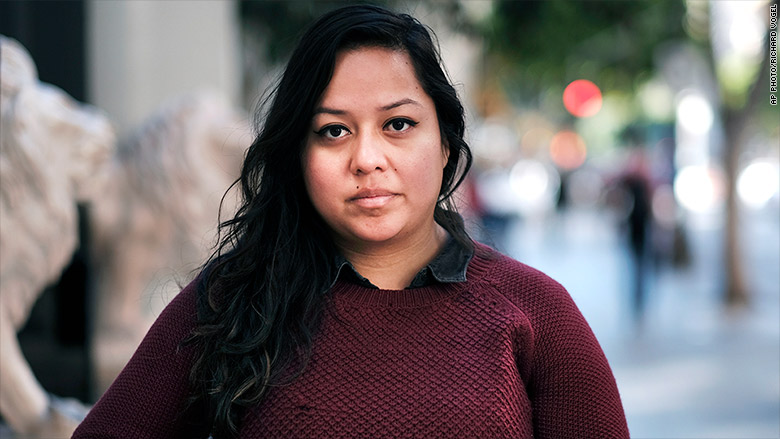
Mitzie Perez is one of the 750,000 DREAMers who are allowed to legally go to college, but their status as temporary residents leaves them with few ways to pay for tuition.
They're not eligible for federal grants or loans. And it's widely known among DREAMers that banks are turning them down for private loans, too.
But for the first time, a bank is being challenged in court over this practice. Perez sued Wells Fargo in January for denying her a student loan.
"I feel like I'm still kind of being criminalized. I just want to go to school," said Perez, who came to the U.S. from Guatemala at the age of 5.
Of the 46% of DREAMers currently in school, a majority of them are also working, just like Perez. That's how she paid for two years of community college out-of-pocket. But she needed a loan when she transferred to the University of California, Riverside earlier this year.
Related: How Trump can stay tough on immigration and protect DREAMers, too
The lawsuit alleges that Wells Fargo denied Perez a loan solely based on the fact that she is not a U.S. citizen or permanent resident -- and that this violates federal and state laws prohibiting discrimination based on immigration status.
After Perez answered a few preliminary questions for the bank's online application -- including one about her residency status -- a message popped up that said Wells Fargo did not have a student loan option that met her needs, according to the lawsuit.
"This could be due to the school you selected, your field of study, and/or your citizenship status," the message read.
When Perez went back to try to understand why exactly she was denied, she found that changing her citizenship answer would allow her to proceed.
While it's common practice for banks to ask about residency status for a loan applicant, Perez's lawyers contend that it cannot be the only factor used to determine whether they qualify for a loan.
"This is about being disqualified upfront, without any consideration of the relevant qualification criteria for assessing risk," said Thomas Saenz an attorney at the Mexican American Legal Defense and Educational Fund which is representing Perez.
Related: What's at stake for sanctuary cities
In a statement, Wells Fargo (WFC) said it was "disappointed that they filed a lawsuit rather than work with us on solutions to help people realize their goals of higher education."
"We remain focused on our responsible lending practices to assist temporary and permanent residents and U.S. citizens in obtaining student financing," it said.
The Deferred Action for Childhood Arrivals (DACA) was put into place by President Obama in 2012. It allows people like Perez, who meet several guidelines, to legally work for a period of two years, subject to renewal. It also gives them a Social Security number and allows them to get a driver's license.
Despite his tough stance on illegal immigration, President Trump's administration said he doesn't intend to deport DACA recipients. Instead, he will initially focus its efforts on immigrants with criminal records.

Perez's lawsuit only names Wells Fargo, but Saenz suspects other banks do the same.
"We don't have to sue all banks at once and we don't have the resources to do so," he said.
In fact, a spokeswoman from PNC Bank told CNNMoney that its current student lending underwriting criteria requires borrowers to have U.S. citizenship or full-time resident status.
That would disqualify DREAMers, who have temporary resident status.
Citizens Bank did not return a request for comment, but specifies online that you need to be a citizen or permanent resident to be eligible for a student loan.
Another student lender, Discover, posts similar information online, but told CNNMoney that it "does not differentiate between borrowers based on DACA status, and would loan to such individuals if they were otherwise qualified."
According to the Consumer Financial Protection Bureau, a bank cannot discriminate based on national origin. But it is allowed to ask about your residency.
A spokesman for the CFPB would not comment on the Wells Fargo lawsuit specifically.
Related: This could help fix America's student debt crisis
"It's very difficult for DREAMers to get private loans from banks," said Candy Marshall, the president of The Dream.US, an organization that gives scholarships to students in this specific situation.
Without being eligible for federal need-base aid, they already need to come up with more money to foot the tuition bill than other low-income students. And many state colleges charge them the more expensive out-of-state tuition rates because they consider them international students.
"For students where there's no in-state tuition for them, then it's truly almost impossible to afford college," Marshall said.
Most of them end up enrolling in a community college and taking one or two classes a semester while working full-time, she said.
Perez used credit cards to pay her tuition bill this year. Those, of course, have credit limits and carry high interest rates.
"I'm thinking of maybe putting off my education for awhile because I just can't afford it," she said.
